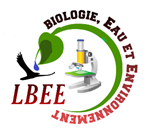
The Laboratory of Biology, Water and Environment (LBEE) is one of the 25 research laboratories of the 8 Mai 1945 Guelma University. It was created by ministerial decree of March 16, 2011. The activities are led by five (05) research teams composed of 50 permanent researchers and 26 PhD students. The laboratory is under the direction of Professor BOUDALIA Sofiane.
The objectives:
The main objective of the laboratory is to train young researchers in research and through research, using the results obtained in the teams, ensuring scientific dissemination by making it accessible to researchers from different horizons. The development of quality scientific research, which takes into account national guidelines and needs, and universal incentives and concerns, is equally important.
The research activities of the Laboratory of Biology, Water and Environment "LBEE" study all possible interactions between the biocenosis (fauna, flora and microflora) with their biotope (essentially aquatic environments).The latter are considered to have played a vital and primordial role at the dawn of the great civilizations. Thus, marshes, wadislakes and swamps have, for almost two millennia, inherited a reputation that has dramatically declined in most continents, particularly in the twentiethcentury technological advances that allowed for their transformation.Indeed, this rapid disappearance had at least the merit of rediscovering the importance of these continental and coastal hydrosystems.
However, it soon became clear that their decline was accompanied by major environmental or ecological disturbances, such as an increase in the frequency of devastating floods, the degradation of water quality and the sometimes considerable decline of some bird populations.Waterand fish resources of the great rivers. These great civilizations that are built under a special relationship with its aquatic ecosystems (large rivers and lakes) that caused a certain imbalance causing the accumulation of micro pollutants and the emergence of diseases transmissible by water ( the M.T.H).
This research laboratory by its wide coverage of topics coveredreflects our concern to bring the acute programs ofthe moment (source of nuisance, animal reproduction,and destabilization of ecosystems) to equations put into practice to study both the causes, their impact and identify concrete proportions for implementation for sustainable development and significant scientific advance.
The main scientific goal is to study and characterize the different aquatic ecosystems (lotic and lentic) and their environments in our region (biology, hydrochemistry, hydrogeology, geology and preservation of species by reproduction) and to determine the anthropogenic factors exerted onas well as exploring their consequences (eco-toxicological, toxicological and microbial) and their impacts on humans, animals and the environment. Consider also the relationship between human health and the environment, which is of considerable importance at a time when the announced catastrophes and pandemics continue to multiply. While infectious diseases in recent centuries had been relatively well controlled, or circumscribed, warnings about the proliferation of sources of contamination are again raised.Global warming is causing offshoring of transmission vectors, thereby expanding potential sources of bacterial or viral contagion.The global warming causes relocation vectors of transmission, thus extending the potential sources of bacterial or viral infection.
